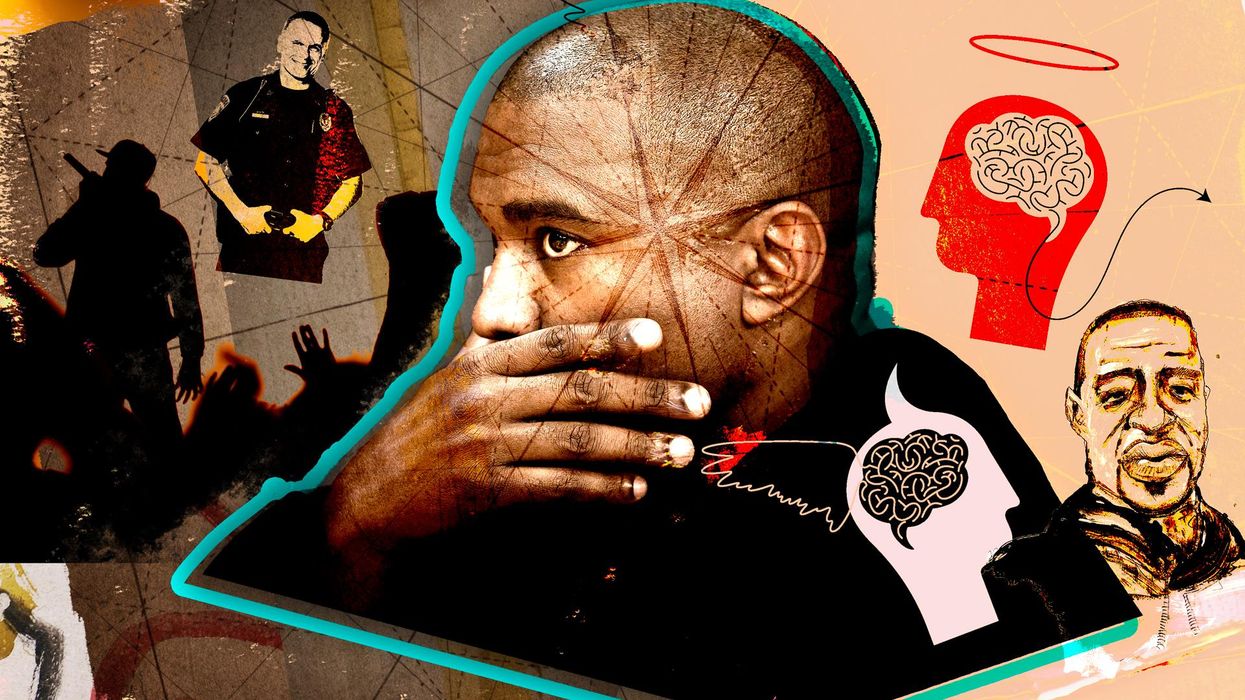
Getty Images

Kanye West is back in the news cycle, and this time he’s brought some friends. The mercurial rapper dragged fellow hip-hop veteran N.O.R.E into his drama when he brought up George Floyd on the rapper’s "Drink Champs" podcast. West stated, “They hit him with the fentanyl” and that Derek Chauvin’s knee wasn’t on Floyd’s neck “like that.” The inference that most people drew is that Kanye believes George Floyd died of a drug overdose and not Chauvin kneeling on him for over eight minutes.
What amounted to a few seconds within a longer conversation sent social media into a frenzy and N.O.R.E. into full damage control mode. The fact that the medical examiner who performed Floyd’s autopsy found that heart disease and fentanyl were contributing factors to his death has become irrelevant in the face of the larger narrative. N.O.R.E. called into "The Breakfast Club" radio show to apologize to George Floyd’s family and anyone else who was “hurt” by Kanye’s comments.
This was a groundbreaking moment in hip-hop history. For more than 30 years, concerned listeners, parents, and activists have called for artists to be more careful with their words. Their pleas have generally been ignored.
Until now.
Hip-hop has seen the light. It has repented of its sins and developed a conscience. And all it took was one of its icons questioning the manner in which one man died.
There has been a great deal of attention on Kanye, his decision to wear a “White Lives Matter” shirt, his interview with Tucker Carlson, and several comments he has made about Jewish people in media and entertainment.
But hip-hop’s epiphany is about more than one man. It is a valuable example of beliefs, values, standards, and shame. And people like N.O.R.E. and Maverick Carter – LeBron James’ business partner – make several things clear. Killing black men and degrading black women doesn't qualify as “hate speech.” Likewise, “harmful stereotypes” don’t include videos with guns pointed at the camera or strippers with enhanced backsides bigger than Sarah Baartman’s.
When it comes to the behaviors hip-hop’s gatekeepers are willing to enforce, some groups take a much higher priority.
The people who police the borders of rap culture have had decades to enforce moral standards. They chose not to do soafter Snoop Dogg publicly attacked Gayle King for bringing up Kobe Bryant’s rape charge shortly after his death in 2020. He concluded his rant this way:
“Funky dog-head b*tch, how dare you try to tarnish my m*therf*cking homeboy’s reputation, punk m*therf*cker? Respect the family and back off, b*tch, before we come get you.”
Snoop Dogg apologized to King after talking to his mother.
The hip-hop culture police were much more forceful with rapper DaBaby after he used crude language about sex acts and HIV at a concert in 2021. The LGBT community and its allies made the artist apologize within days. The message was clear: Vulgar comments about no one in particular are unacceptable, but threats to specific female journalists are fine.
It certainly isn’t an aversion to violence that made the keepers of hip-hop culture see the light. The entire hip-hop ecosystem is fueled by packaging violence – and the “realness” of the artists who rap about it – for consumer consumption.
The number of artists who talk about shooting and killing “n*ggas” is too long to list. The same goes for the objectification of women in lyrics and videos. There was a period of time in hip-hop culture when “video vixens” were so influential that other women started getting black market butt injections to look like them. BET produced a documentary called "Killer Curves" that provided an honest look at the fallout from such distorted beauty images, including women who had their legs amputated and others who died from having foreign substances injected into their bodies.
Female artists like Nicki Minaj, Cardi B, and Megan Thee Stallion grabbed the flesh-peddling baton from their male counterparts and moved women in hip-hop from background eye candy to the queenpins of stripper culture. Their influence, coupled with the advent of social media, has made the bare bottom the new peace sign for girls and women taking pictures.
I’m glad that hip-hop gatekeepers want to enforce standards of conduct and protect fans from dangerous stereotypes. Unfortunately, these efforts seem like superficial attempts to abide by the rules set by their overlords in the media and big business.
This means hip-hop fans can expect to hear rappers using “she/her” pronouns for a bikini-clad man who thinks he is a woman before calling him a “bad b*tch.” Some may see this as progress, but real repentance would look like artists casting off the sexual immorality, debauchery, hatred, and rage that characterizes the genre for something much better.
There is nothing about rap music that prohibits artists from promoting messages of love, peace, faithfulness, and self-control. Eminem has been on the hip-hop scene for over 25 years and has never publicly uttered the N-word. There is no reason that his peers have to rap about murder and doing drugs.